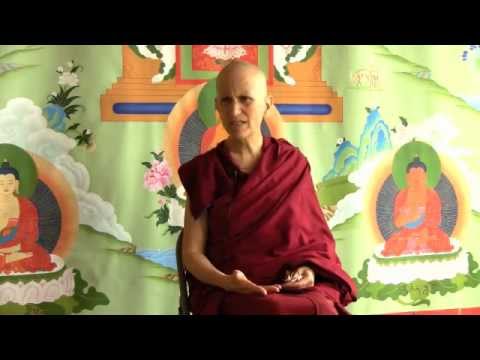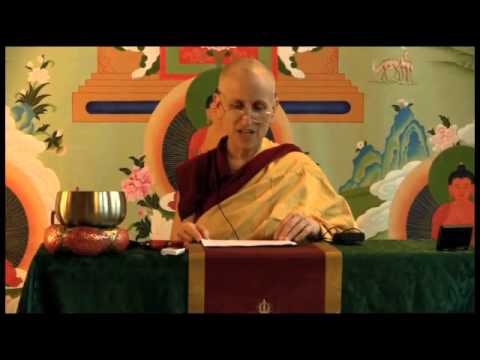Inability to settle on a path
A Crown Ornament for the Wise, a hymn to Tara composed by the First Dalai Lama, requests protection from the eight dangers. These talks were given after the White Tara Winter Retreat at Sravasti Abbey in 2011.
- Doubt can undermine our practice
- Not having confidence in what we’re doing
- Doubting our teachers and the teachings
The Eight Dangers 21: The carnivorous demon of doubt, part 2 (download)
Roaming in the space of darkest confusion,
Tormenting those who strive for ultimate aims,
It is viciously lethal to liberation:
The carnivorous demon of doubt—please protect us from this danger!
So we’ve been talking about doubt. And I thought to talk about one particular kind of doubt that meditators have. I mean, aside from the doubt about “are things inherently existent or not, are they impermanent, are they permanent?” These kinds of things.
[This particular kind of doubt] is, when you start to meditate—or you work really hard to go in retreat—and then you get in retreat, and you’re in retreat, and the first week it’s really good. And then you go, “Gee, I’m not getting anywhere in my retreat. There are people offering service, that are working in society, and they’re really working with compassion, and helping so many people, and I’m just sitting here on my tush, watching my belly button. Maybe I should go out and do some social service work and help people and teach them and spread compassion.”
And then you leave your retreat and you go out and you do some work. And then you come … And it’s really nice, and these people benefit, and it’s really good for a week. And then you come home and you go, “Well, yes, I’m helping all these people, but I don’t really know anything. My Dharma knowledge isn’t very good. And my compassion isn’t very steady myself. So I need to actually learn more before I can help anybody.”
So, you stop your helpful work to people, and then you go and you enroll in a Dharma school. And then you study real hard. And that’s really good, like, for a week or so. And, “I’m really learning so much, this is really beneficial.” But then after a week you go, “But this is all just intellectual knowledge, it’s just words and more words, and people’s theories and concepts. I don’t need theories and concepts. I need to meditate. I need experience.”
So then you leave school and you go and you work and you find a retreat situation and you sit down to meditate. And it’s really good for a week. And then you go, “But I’m just sitting here and all these other people are benefiting people, and I should be out benefiting people.”
And so then you leave your retreat and you go and you do your social work, you know, help, benefit and teach people. And then you get tired of that because you don’t know anything, and then you go back and you learn some more. And then you get fed up with it, it’s too many concepts and words. And then you want to go back and just meditate. And you keep going around in circles.
I see a lot of nodding heads here.
And so this is all caused by doubt. Because we don’t really have confidence in what we’re doing. And if our teacher tells us to do something, we don’t have confidence in the teacher to follow the instructions. And instead we think, “Oh, what does the teacher know about me? They don’t know me. I know myself better. I mean, after all, I’m almost omniscient. I’m going to get enlightened in this lifetime. I can guide myself. I don’t need some screwy teacher who just is going to tell me what to do and boss me around. Forget that. I had enough of that one.”
It’s true, isn’t it? That’s the way we are.
And so we doubt our teacher. We doubt our practice. We doubt everything. But like I said yesterday, when doubt is in our mind we don’t realize it as doubt, and we believe everything we think. And that’s why this book is going to be called Don’t Believe Everything You Think. Because this is what happens, isn’t it? And we just go round and round, round and round, and, you know, this is what we’ve been doing since beginningless time. Isn’t it? They call it cyclic existence for a reason. And we’ve been guiding ourselves, and inventing our own path, and sometimes meditating, and then leaving that to go study, and then leaving that to do social work, and then leaving that to meditate. And all this stuff we’ve been doing again and again and again, and we’re still in cyclic existence, aren’t we.
But Buddha gives us some advice and we say, “I don’t know about that. What does Buddha know? He lived 2,600 years ago. He doesn’t understand my life.” Okay.
But this is how doubt runs us around. And how our own ignorance and our own arrogance … Because there’s a certain kind of arrogance that believes our doubt. Doesn’t it? And this is how all these disturbing mental factors just run us around and keep us digging those holes in the ground, which we keep decorating. [Laughter]
So that’s why we have to recognize doubt as doubt, and stubbornness and ignorance for being what they are. And then develop our own wisdom. But it helps to … you know, sometimes other people may know things. You know? Once in a while. Not very often, of course. But once in a while they might actually have some good advice, and they may know something. [Laughter]
But like I said, only once in a while. Not too often. Because most of them are usually pretty stupid. And that’s why we have so much compassion for them. [Laughter]
Venerable Thubten Chodron
Venerable Chodron emphasizes the practical application of Buddha’s teachings in our daily lives and is especially skilled at explaining them in ways easily understood and practiced by Westerners. She is well known for her warm, humorous, and lucid teachings. She was ordained as a Buddhist nun in 1977 by Kyabje Ling Rinpoche in Dharamsala, India, and in 1986 she received bhikshuni (full) ordination in Taiwan. Read her full bio.


